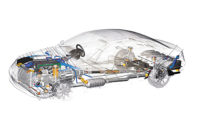South Bend, home to the University of Notre Dame, has a long history of manufacturing. In the past, the city in northern Indiana hummed with large factories belonging to companies such as Bendix Corp. (automotive and aircraft brakes), Oliver Chilled Plow Works (agricultural equipment) and Studebaker Corp. (cars, trucks and wagons).
Today, that heritage is alive and well among large manufacturers such as AM General (military vehicles), Forest River Inc. (recreational vehicles), Lippert (recreational vehicle components), Tenneco (automotive parts) and Thor Motor Coach Inc. (recreational vehicles). But, many smaller firms also thrive in the area.
To help manufacturers in the South Bend-Elkhart region adopt 21st century production tools and technologies, Notre Dame recently established iNDustry Labs. The collaborative initiative provides strategic insight, expertise and technical resources to regional businesses seeking to thrive in the digital age of manufacturing.
“iNDustry Labs is a platform for collaboration between Notre Dame and local industry partners in Elkhart, Marshall and St. Joseph Counties,” says Scott Ford, managing director. “Our goal is to provide insights, technical expertise, and research and development activities that, along with the engagement of talented undergraduate and graduate students, can help unlock a competitive advantage for regional businesses.
“We have one of the highest concentrations of manufacturing employment in the United States,” explains Ford. “However, this region is the third most vulnerable in the U.S. to negative disruption through automation.
“Half of the local workforce is in jobs that are at risk to be automated,” Ford points out. “It’s imperative to couple the support for digital manufacturing with resources for training and skill development to expand opportunities for the workforce through the transition.”
Most manufacturers in the region are small- to medium-sized, privately held, family-owned businesses. According to Ford, companies slow to change their practices are vulnerable to disruption. To survive and thrive, they must incorporate or expand the use of Industry 4.0 practices to gain the benefits of real-time data, interconnectivity and automation.
Notre Dame’s iNDustryLabs serves as anchor of the LIFT Network. LIFT (Labs for Industry Futures and Transformation) is a set of programs, facilities and expertise that unites two of the region’s main economic drivers—its powerful manufacturing base and Notre Dame, a leading research university. Powered by a $44 million Lilly Endowment grant awarded in 2019, the effort aims to “unlock transformative potential for the regional economy.”
More than a dozen Notre Dame faculty members from cross disciplines, such as business and engineering, are involved with iNDustry Labs. The organization is also supported by a team of fellows who have backgrounds in engineering, industrial design, data analytics and digital operations.
They are joined by summer interns from Notre Dame and other top engineering programs at schools such as Northwestern University, Purdue University and the University of Michigan.
The fellows—typically young professionals with post-graduate degrees—provide support to iNDustryLabs’ faculty and staff as they collaborate with local manufacturers. They help develop and implement strategic plans for product and process innovation to diversify and grow business operations.
“We often hear from many companies that their limitations aren’t necessarily with ideas or capital—it’s with talent that drives those projects,” says Ford. “So, we embed a fellow with a company to implement strategic projects. Some of those companies, in turn, eventually hire those individuals.”
Another unique service of iNDustry Labs is its Industry 4.0 assessment. Local manufacturers are encouraged to complete an online survey that comprises 38 questions. The majority of them refer to manufacturing operations and supply chain management, with questions such as:
- How visible is the production performance of your manufacturing activities?
- How do IT systems help to manage the quality processes?
- How flexible is your production facility?
- To what extent does the organization have defined strategies and processes for managing strategic suppliers?
- To what extent does your business procurement function utilize technology to automate and streamline the complete supplier management lifecycle?
- To what extent can you track and trace your product across the supply chain from end to end?
- How integrated are your demand, supply and production planning activities?
- How would you describe the integration of engineering and manufacturing in your business processes?
The assessment survey is followed up with in-person focus groups and gemba walks to learn more. The goal is to provide a step-by-step plan for how a company can improve its operations by adding value and addressing immediate concerns.
“We don’t go into a company with a technology solution and then say ‘this is what you have to do,’” explains Ford. “Instead, we try to learn each company’s challenges, pain points and limitations to growth. Through that process, we can often introduce a new perspective and encourage adoption of new production practices or technologies.”
Although every manufacturer is unique and has its own challenges, Ford says the best way for small companies to get started with Industry 4.0 initiatives is to be able to track some operational indicators and basic performance data.
“It doesn’t require high-power computers,” explains Ford. “You just have to be able to look at data and start to see patterns or relationships.”





